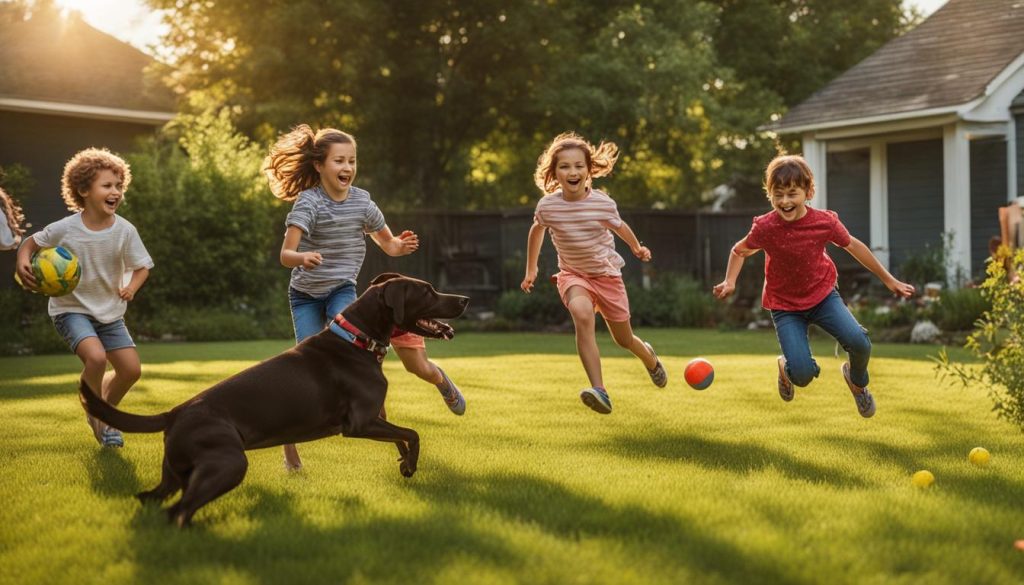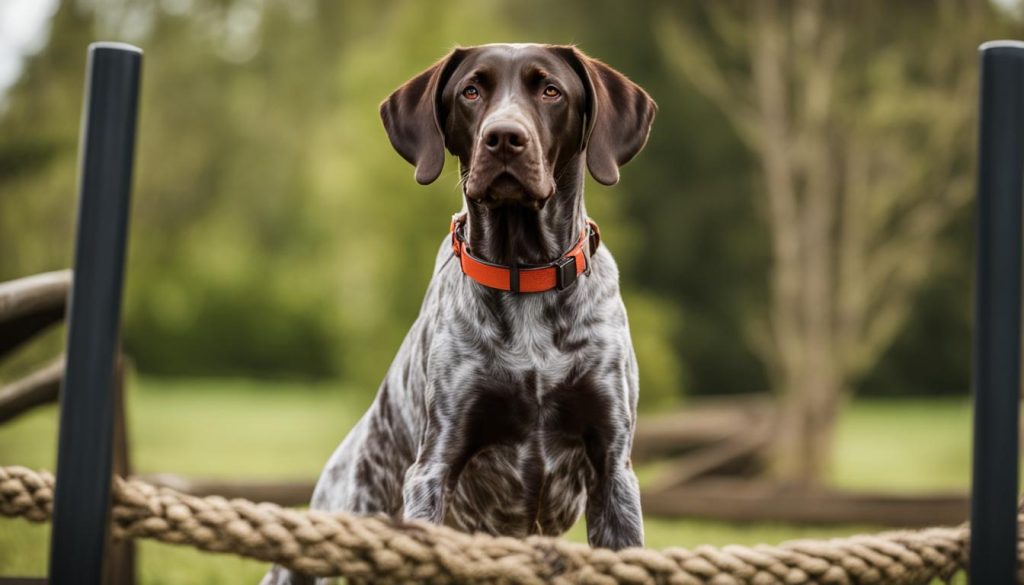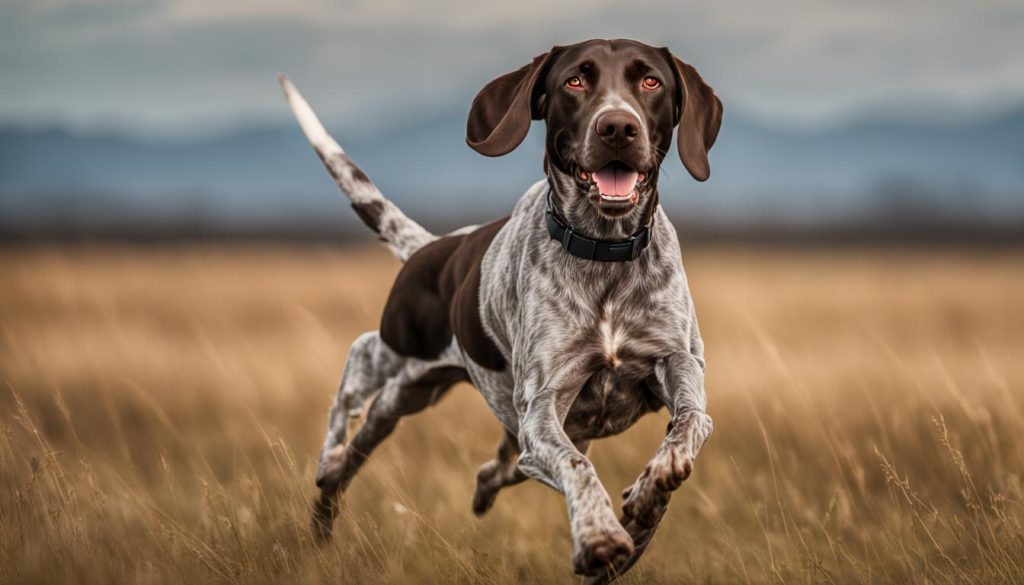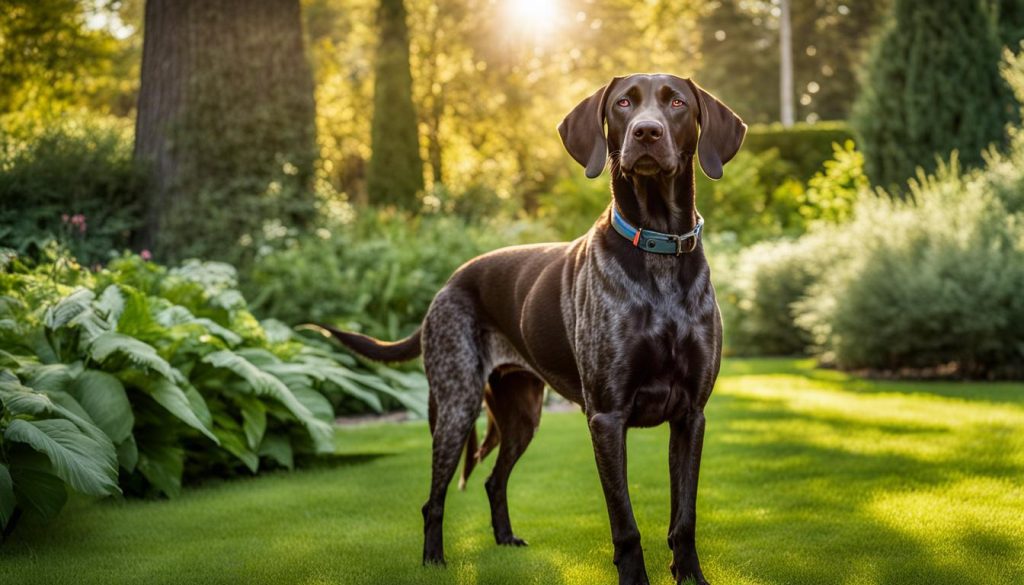German Shorthaired Pointers are large, muscular dogs known for their energy and affection. While they may pose challenges for first-time owners, they are considered to be good family dogs. With a lifespan of 12-14 years, weighing between 25-32kg and standing between 53-64cm tall, they make loyal companions. Available in liver, white, and black color variations, German Shorthaired Pointers belong to the Gundog group and are generally suitable for owners with some experience.
These dogs have high exercise needs and require regular active walks, with a minimum of two hours of walking per day. While generally healthy, they may drool and need grooming once a week. German Shorthaired Pointers are friendly with everyone, including other dogs, and can be trained to get along with other pets. They are great family dogs but need a large garden and are better suited for semi-rural areas.
Key Takeaways:
- German Shorthaired Pointers are large, energetic, and affectionate dogs, making them good family dogs.
- They belong to the Gundog group and are generally suitable for owners with some experience.
- These dogs require regular exercise, grooming, and a large garden.
- German Shorthaired Pointers are friendly with everyone, including other dogs and can be trained to get along with other pets.
- They are great companions but need an active and experienced family to meet their needs.
German Shorthaired Pointer Temperament and Behavior

German Shorthaired Pointers have a good-natured and adaptable temperament. While they were originally bred as hunting dogs, they are also known for their high energy level. They are best suited for active owners who can provide them with regular exercise such as running, biking, or hiking. They have a tendency to bark and be hyperactive if confined for too long.
German Shorthaired Pointers have varying degrees of friendliness towards strangers, ranging from very friendly to somewhat reserved. They are not an aggressive breed and are generally good with other pets, although some individuals may be aggressive towards strange dogs and have a strong instinct to chase cats.
Obedience training is necessary to instill self-discipline and control in this breed, as they can be intense and easily distracted. They are trainable but may have a mind of their own and require patience and firmness in training.
German Shorthaired Pointers have a good-natured and adaptable temperament. They are best suited for active owners who can provide them with regular exercise. They have a tendency to bark and be hyperactive if confined for too long.
German Shorthaired Pointers’ High Energy Level
German Shorthaired Pointers are known for their high energy levels. They require regular physical exercise to stay happy and healthy. Activities such as running, biking, or hiking are ideal for them. Without adequate exercise, they may become restless and exhibit behaviors such as barking or hyperactivity. It’s important to keep them mentally stimulated as well, as they are intelligent dogs that enjoy learning new things.
Friendliness and Compatibility
German Shorthaired Pointers are generally friendly dogs, but their level of friendliness towards strangers can vary. Some individuals may be more reserved, while others are very outgoing. They are typically social with other dogs and can get along well with other pets if properly introduced and socialized. However, their hunting instincts may make them prone to chasing smaller animals such as cats, so caution should be exercised when introducing them to new pets.
Overall, German Shorthaired Pointers have a temperament that can make them suitable for family settings. However, their high energy levels and need for exercise and mental stimulation should be taken into consideration by potential owners.
German Shorthaired Pointer Compatibility with Kids

German Shorthaired Pointers are known to be good family dogs and are generally considered compatible with kids. Their loyal and loving nature makes them excellent companions for children. They enjoy being part of family activities and can handle the energy and playfulness of kids.
Proper socialization and training are important to ensure a positive interaction between German Shorthaired Pointers and children. It is crucial to teach children how to approach and interact with dogs respectfully, and to supervise their interactions to prevent any accidental harm to either the child or the dog. This will help establish a strong bond and mutual understanding between them.
German Shorthaired Pointers have a natural instinct to protect their family members, including kids. However, as with any dog breed, it is essential to teach children how to behave around dogs and to never leave them unsupervised, especially with very young children. Teaching children to respect the dog’s boundaries and personal space is crucial to ensure a harmonious and safe environment for both.
Benefits of German Shorthaired Pointers for Kids:
- They are loyal and loving companions.
- They enjoy being part of family activities.
- They have high energy levels, matching the enthusiasm of kids.
- They can handle rough play and are generally tolerant of children’s behavior.
Overall, German Shorthaired Pointers can be a great addition to families with kids, providing love, companionship, and an active lifestyle for all family members. With proper training, socialization, and supervision, German Shorthaired Pointers can thrive in a family environment and create lasting memories for children.
German Shorthaired Pointer Trainability

German Shorthaired Pointers are known for their intelligence and trainability, making them suitable for families looking for a dog they can easily train and teach new tricks. However, their trainability can vary from individual to individual, and some may require more time and effort to train than others.
When it comes to training German Shorthaired Pointers, it’s crucial to establish yourself as the pack leader and use positive reinforcement techniques such as treats, praise, and play to motivate and reward desired behaviors. Consistency is key, as they can be willful and independent at times.
To ensure successful training, it’s recommended to start early and enroll your German Shorthaired Pointer in obedience classes or work with a professional dog trainer who specializes in positive reinforcement training methods. These classes can help you build a strong foundation of basic commands and teach you how to effectively communicate with your dog.
Training Tips for German Shorthaired Pointers:
- Start training early and be consistent
- Use positive reinforcement techniques like treats and praise
- Enroll your dog in obedience classes or work with a professional trainer
- Keep training sessions short and engaging
- Be patient and understanding, as each dog learns at their own pace
German Shorthaired Pointers are highly trainable, but they require a firm and patient approach. With the right training methods and consistent practice, they can excel in obedience training, agility, and other dog sports. Remember to make training sessions fun and engaging to keep your German Shorthaired Pointer motivated and focused.
German Shorthaired Pointers’ Exercise Needs

German Shorthaired Pointers are highly active dogs that require ample exercise to maintain their physical and mental well-being. Their exercise needs are essential for their overall health and happiness. These energetic dogs thrive on outdoor activities and enjoy engaging in various forms of exercise such as running, hiking, and swimming.
To meet their exercise needs, German Shorthaired Pointers require at least 60-90 minutes of energy-burning play every day. This can be achieved through activities that provide both physical and mental stimulation. Regular exercise not only helps to prevent boredom and destructive behavior but also promotes good muscle tone and cardiovascular health.
It is important to note that German Shorthaired Pointers are not suitable for sedentary lifestyles or homes with limited space. These dogs thrive in environments where they have access to a large garden or a safe, fenced yard, allowing them to run and play freely. Without sufficient exercise, they may become restless and exhibit behaviors such as excessive barking and destructive chewing.
In summary, German Shorthaired Pointers have high exercise needs and require regular opportunities for vigorous activity. Providing them with the exercise they require is crucial for their well-being and helps to ensure they remain happy and balanced family pets.
German Shorthaired Pointers’ Needs for Space and Environment

German Shorthaired Pointers require ample space and a suitable environment to thrive. Due to their energetic nature and exercise needs, they are not well-suited for living situations with close neighbors, such as apartments or condos. Instead, they are better suited for homes in suburban or semi-rural areas where they can have access to a safe, fenced yard and plenty of outdoor space to roam and engage in various activities.
These dogs are athletic and require regular opportunities for vigorous exercise. They thrive on outdoor activities such as running, hiking, and swimming. A large garden or the ability to access safe outdoor spaces is essential for them to burn off their energy and maintain their overall well-being. Without sufficient exercise, they may become bored, restless, and exhibit undesirable behaviors like excessive barking or destructive chewing.
German Shorthaired Pointers’ need for space also extends to their living environment. They benefit from a home that provides enough room for them to move around freely and comfortably. It’s important to have enough space for them to stretch out and relax, as well as have designated areas for eating, sleeping, and playing. Additionally, their living environment should be safe and secure, minimizing any potential hazards or escape routes.
The Importance of Outdoor Space
An outdoor space that meets the needs of German Shorthaired Pointers is crucial for their physical and mental well-being. It allows them to engage in their natural behavior, explore their surroundings, and satisfy their strong hunting instincts. This outdoor space should be securely fenced to prevent them from escaping and ensure their safety.
Providing a suitable environment for German Shorthaired Pointers involves more than just physical space. Mental stimulation is equally important. These intelligent dogs thrive on mental challenges and enjoy activities that engage their minds. Interactive toys, puzzle feeders, and training sessions can all help provide mental enrichment.
| Space and Environment Needs | Requirements |
|---|---|
| Outdoor Space | A large, securely fenced yard or access to safe outdoor areas for exercise and exploration. |
| Living Environment | Adequate indoor space that allows for movement and designated areas for eating, sleeping, and playing. |
| Mental Stimulation | Provide interactive toys, puzzle feeders, and training sessions to engage their minds. |
Creating a space and environment that caters to the needs of German Shorthaired Pointers is essential for their overall well-being and happiness. With enough outdoor space, mental stimulation, and a safe living environment, these dogs can thrive as beloved members of active families.
German Shorthaired Pointers’ Grooming and Care

When it comes to grooming, German Shorthaired Pointers are relatively low-maintenance. Their short coat requires simple brushing once or twice a week to remove loose hair. This not only keeps their coat healthy but also helps to minimize shedding. Speaking of shedding, German Shorthaired Pointers do shed moderately, with heavier shedding seasons occurring in the spring and fall. Regular brushing during these times can help to manage the amount of hair left around your home.
In addition to brushing, German Shorthaired Pointers only need occasional bathing. Typically, they only require bathing three or four times a year, unless they get dirty from outdoor activities. Overbathing can strip their coat of its natural oils, so it’s important to keep bathing to a minimum to maintain their coat’s health and shine.
Proper care for a German Shorthaired Pointer also includes regular ear cleaning to prevent ear infections. Their floppy ears can trap moisture and debris, making them more prone to infections. Cleaning their ears once a week using a veterinarian-recommended solution and cotton balls can help prevent any issues from arising.
Dental care is also essential for German Shorthaired Pointers. Like all dogs, they are susceptible to dental problems such as tartar buildup, gum disease, and tooth decay. Daily toothbrushing with dog-friendly toothpaste and annual professional dental cleanings are important to maintain their oral health.
| Grooming Needs | Frequency |
|---|---|
| Brushing | Once or twice a week |
| Bathing | Three or four times a year |
| Ear Cleaning | Once a week |
| Dental Care | Daily toothbrushing, annual professional cleanings |
Overall, German Shorthaired Pointers require minimal grooming but benefit from regular maintenance to keep them clean, healthy, and comfortable.
“Regular brushing and occasional bathing are all that is needed to keep a German Shorthaired Pointer looking and feeling great. With their short, low-maintenance coat, they are a perfect choice for individuals and families who prefer a dog that requires less grooming.”
German Shorthaired Pointers’ Health Concerns
When considering German Shorthaired Pointers as family pets, it’s important to be aware of potential health concerns that may arise. While these dogs are generally healthy, certain conditions can affect them. By understanding these issues, owners can take proactive measures to ensure the well-being of their furry companions.
Common Health Concerns
German Shorthaired Pointers are prone to a few specific health problems. Some of the common conditions include:
- Bloat: A serious stomach condition that requires immediate veterinary attention.
- Hip Dysplasia: A genetic condition that affects the hip joint, which can lead to pain and mobility issues.
- Eye Diseases: Conditions such as cataracts and progressive retinal atrophy can affect vision.
Regular veterinary check-ups and preventive care are crucial for early detection and treatment of these health issues. Early intervention can help alleviate symptoms and improve the overall quality of life for these dogs.
Providing Care and Monitoring
German Shorthaired Pointers require a balanced diet, regular exercise, and mental stimulation to maintain their optimal health. Owners should monitor their weight to prevent obesity, as excess weight can exacerbate joint-related issues. Additionally, maintaining good dental hygiene with regular toothbrushing and professional cleanings can help prevent dental problems.
Owners should also be vigilant for any signs of discomfort or changes in behavior and consult with a veterinarian if any concerns arise. Prompt and appropriate care can help manage and mitigate potential health issues, ensuring that German Shorthaired Pointers can lead happy and healthy lives as cherished family pets.
| Health Concerns | Symptoms | Treatment |
|---|---|---|
| Bloat | Restlessness, swollen abdomen, unproductive attempts to vomit | Emergency medical intervention, surgery |
| Hip Dysplasia | Lameness, difficulty in moving, decreased range of motion | Medications, physical therapy, surgery |
| Eye Diseases | Cloudy or opaque lenses, vision loss or impairment | Medications, surgery (in severe cases) |
Note: The table above provides a summary of common health concerns, their symptoms, and possible treatments. It is essential to consult with a veterinarian for accurate diagnosis and personalized treatment options.
German Shorthaired Pointer as the Perfect Family Pet

When it comes to choosing the perfect family pet, German Shorthaired Pointers are an excellent choice. With their good-natured temperament and high energy level, they can be loyal and loving companions for active families. They are known for their affectionate nature and their desire to be part of the family activities.
German Shorthaired Pointers are great with kids and can get along well with other pets when properly socialized and trained. They thrive in an environment where they can receive regular physical and mental stimulation. Their athleticism makes them ideal for families who enjoy outdoor activities such as running, hiking, and swimming.
While German Shorthaired Pointers require commitment in terms of exercise and grooming, they offer endless love and companionship in return. Their loyalty and adaptability make them the perfect addition to any family who is willing to provide them with the care and attention they need.
Wrapping Up
To summarize, German Shorthaired Pointers are excellent family dogs, particularly for active and experienced owners. With their good-natured temperament and friendly disposition, they can bring joy and companionship to any family. While they may require some patience and firm training, their loyalty and love for their families make them an ideal choice.
These family-friendly dogs are known for their compatibility with children, making them great playmates for kids. With proper socialization and training, German Shorthaired Pointers can form strong bonds with children and become their loyal protectors.
However, German Shorthaired Pointers have specific needs that must be met for their overall well-being. Regular exercise, mental stimulation, and grooming are essential to keep them happy and healthy. Owners should also provide them with a suitable environment, such as a large garden or access to safe outdoor spaces, to allow them to thrive.
Overall, if you’re an active and experienced owner looking for a loving and energetic family dog, German Shorthaired Pointers can be a great choice. With their friendly nature, trainability, and compatibility with children, they can become cherished members of your family.
FAQ
Are German Shorthaired Pointers good family dogs?
Yes, German Shorthaired Pointers can make great family dogs. They are known to be loyal, loving, and enjoy being part of the family activities.
What is the temperament of German Shorthaired Pointers?
German Shorthaired Pointers have a good-natured and adaptable temperament. They are generally friendly with people and other dogs, although individual temperaments can vary.
Are German Shorthaired Pointers compatible with kids?
Yes, German Shorthaired Pointers are generally considered to be good with kids. They are known to be loyal and loving towards their families, including children.
Are German Shorthaired Pointers easy to train?
German Shorthaired Pointers can be trained, but they may have some training difficulties. They have an independent mind and can be easily distracted, so patience and consistency are key.
How much exercise do German Shorthaired Pointers need?
German Shorthaired Pointers have high exercise needs and require at least 60-90 minutes of energy-burning play every day. They thrive on outdoor activities and enjoy running, hiking, and swimming.
What kind of environment do German Shorthaired Pointers need?
German Shorthaired Pointers need a large garden or access to a safe, fenced yard where they can safely run and play off-leash. They are better suited for homes in suburban or semi-rural areas.
How much grooming do German Shorthaired Pointers require?
German Shorthaired Pointers have a short coat that requires simple brushing once or twice a week to remove loose hair. They shed moderately and require occasional bathing.
What are the health concerns for German Shorthaired Pointers?
German Shorthaired Pointers are generally healthy dogs, but they can be prone to certain health issues such as bloat, hip dysplasia, and eye diseases. Regular veterinary check-ups are important.
Are German Shorthaired Pointers good family pets?
Yes, German Shorthaired Pointers can make wonderful family pets for the right owners. They are loyal, loving, and enjoy being part of the family activities.






